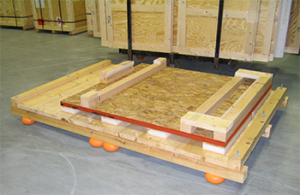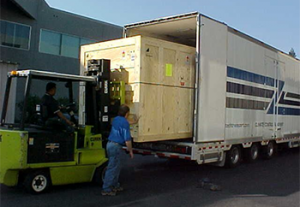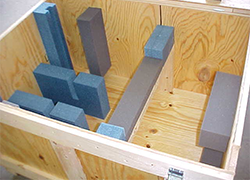How will your product be packaged when it’s ready to leave your facility and travel to your customer’s site? Nestled in packing “peanuts” inside a cardboard box? Or secured on a custom-built skid, cushioned by foam cut to match every contour, and protected from all sides by a wooden shipping crate?
Some products will travel well strapped to a pallet and protected only by shrink-wrap. But most products aren’t that indestructible. If your product would suffer damage if other containers were stacked on top of it or a careless forklift operator pierced your packaging, it’s time to think seriously about a custom shipping crate.
A custom crate is a NECESSITY if your product is…
Delicate.
Precisely calibrated machinery or other sensitive cargo requires a custom-built crate. Packaging experts can help design a crate and skid that will reduce vibration during the journey, so your equipment arrives at your customer’s location in prime condition.

Heavy.
You will pay a premium for shipping packages over 70 pounds with standard shipping services, such as UPS and FedEx. If your product is heavy, it will benefit from a heavy-duty skid with custom brackets to prevent your product from shifting during travel.
Longer than a standard pallet.
If any part of your product will overhang the edge of a pallet, you run the risk of damage during loading and unloading, not to mention how vulnerable your product will be as other pallets stacked with containers shift around next to your pallet during transit. A custom crate can be built to match your specs and will protect your product from every angle.
Danger with Every Touch
Even if your product is not particularly delicate, long, or heavy, a custom crate could be a very wise investment, especially if your product will be traveling via common carrier.
Direct shipping, where a single driver hauls your product from your site directly to your customer’s location, provides the safest, gentlest journey. But it can be prohibitively expensive because you’re paying for exclusive use of the transportation.

Common carriers are a more economical — and incredibly popular—option. Their fleet of trucks moves millions of products around the country, much like airlines move passengers, by using a series of hubs or terminals. At each hub, packages are unloaded, scanned, put onto conveyor belts, and loaded back onto new trucks. Depending on its ultimate destination, your product might be loaded and unloaded half a dozen times over the course of its journey.
Every instance of handling presents dangers for your package:
- Fork truck operators at the various terminals are under intense pressure to unload and re-load as quickly as possible. So every time your package is handled, it increases the risk of damage from an accidental drop, bounce or puncture.
- To maximize space in their freight trucks and storage facilities, it’s not unusual for packages to be stacked on top of one another (even if they have been marked with “no stacking” warnings.)
- It is also possible that your package may spend time outdoors while waiting to be re-loaded for the next leg of its journey.
A custom wooden crate that incorporates a moisture barrier, desiccant, and shock-absorbing foam could be the difference between a successful shipment or a failed delivery.
Control the Costs
Ordering a custom crate is more costly up-front, but crossing your fingers and hoping your package won’t encounter any pitfalls during transit can be far costlier in the long-run. The cost of a custom-built crate can be calculated and budgeted for. The damage that could be suffered by improperly packaged products is far less predictable.
- Sensitive equipment that suffers vibration during transit may require a technician to be flown to the customer’s site to recalibrate it.
- Machinery with exposed metal parts that began to rust when left outside during a lull in transit will need to be repaired or re-machined.
- A product that over-hung the edges of the pallet and arrived with bent or broken parts will mean that new parts (or a new product altogether) be rush-shipped to the customer’s site.
Unhappy customers are expensive, especially if they take their business elsewhere. Avoid unforeseen expenses by budgeting for a custom crate.
Road-Tested Packaging Solutions from CDC
CDC Packaging can help ensure that your product is shipped in the packaging it deserves. Contact us today to learn more about our custom packaging solutions for every type of product.

